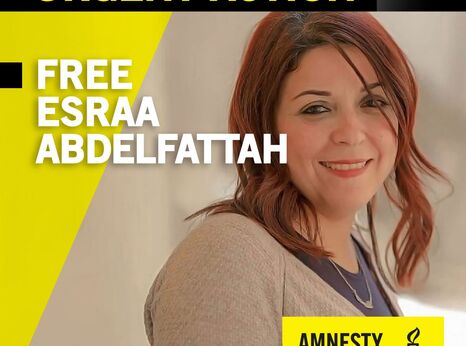Detained journalist accused of terrorism

On the night of 12 October 2019, Esraa Abdelfattah was abducted from her car before being taken to an undisclosed place of detention, managed by the National Security Agency (NSA), and was barred from contacting her family or lawyers. According to Esraa’s account, an NSA officer threatened to torture her after she refused to grant him access to her mobile phone. Several men then entered the room where she was held and began beating her on her face and body. The same NSA officer returned and ordered her again to unlock her phone. When Esraa refused again, the officer took off her sweatshirt, tied it around her neck and threatened to strangle her saying: “your life in exchange for the phone”, until she gave him her password. The officer then cuffed her hands and legs to prevent her from sitting or kneeling and kept her in a standing position for almost eight hours. Another officer warned that she would face further torture if she reported what had happened to the prosecutor. The following day, she described her ordeal to the Supreme State Security Prosecution (SSSP), but prosecutors dismissed her complaint and failed to order investigations. Shortly after her arrest, Esraa went on hunger strike in protest of her detention and treatment. On 22 November 2019, she suspended it because of her deteriorating health condition.
The initial case opened against Esraa (No. 488/2019) includes human rights defender and lawyer Mahienour el-Massry, politician Khalid Dawoud and political science professor Hassan Nefea. To date, the SSSP prosecutor did not produce any evidence against Esraa, other than an NSA investigation case file that neither she nor her lawyers were able to examine.
On 10 March 2020, the Egyptian authorities suspended all prison visits citing COVID-19 fears. The Ministry of Interior announced on 15 August 2020 the resumption of prison visits on 22 August, with some restrictions in place.
On 24 August, Esraa’s sister was allowed to visit her. She learned that Esraa was taken to al-Qanater Prison hospital on 23 August as suffering a haemorrhage. Esraa told her sister that she also suffers from an irregular blood pressure and breathing difficulties that require oxygen therapy at the prison hospital.
Esraa Abdelfattah was among the first human rights defenders in Egypt to face a travel ban in relation to the NGO foreign funding case known as “Case 173. She was prevented from boarding a plane from Cairo International Airport on 13 January 2015. Since then, at least 30 other human rights defenders and civil society staff members have been banned from travel in relation to “Case 173”.
She is among the several prominent human rights defenders who have been rounded up in the aftermath of rare anti-government protests that broke out on 20 September 2019.